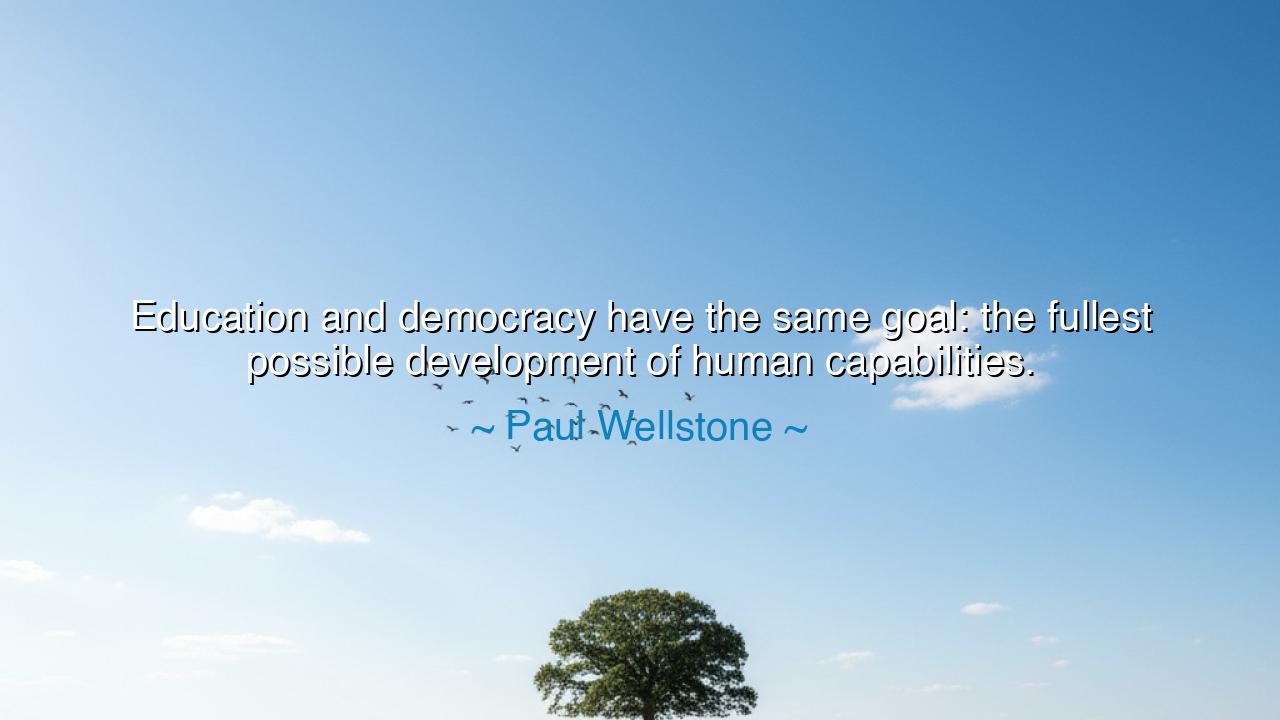
Education and democracy have the same goal: the fullest possible
Education and democracy have the same goal: the fullest possible development of human capabilities.






The great statesman and teacher Paul Wellstone, a man whose heart beat with the rhythm of justice and compassion, once declared: “Education and democracy have the same goal: the fullest possible development of human capabilities.” In these words lies a truth both ancient and eternal—a truth that binds the destiny of a free people to the enlightenment of the human mind. Wellstone, who walked among the halls of power yet never forgot the struggles of the common man, understood that both education and democracy are sacred instruments of liberation. Their purpose is not merely to produce workers or voters, but to awaken citizens—to forge individuals capable of thinking, judging, and creating a better world.
To understand the meaning of his words, we must look to the life and vision of Paul Wellstone himself. Born to immigrant parents, raised in modest circumstances, he became both a scholar and a champion of the people. As a professor of political science before entering the United States Senate, Wellstone devoted his life to teaching that education was not only the path to personal success, but the cornerstone of a just society. He saw democracy not as a mere structure of laws, but as a living spirit that flourishes only when people are empowered by knowledge and compassion. His quote, then, is both a declaration and a warning—that a nation ignorant of education cannot long remain free, and a system of democracy without educated minds becomes a hollow shell.
Education, in Wellstone’s view, is the great equalizer—the force that lifts the human spirit from the darkness of ignorance into the light of understanding. It does not merely teach skills, but nurtures the heart, sharpens conscience, and kindles imagination. Likewise, democracy at its purest is not merely the right to vote—it is the right to think, to speak, to question, and to dream. Both are acts of faith in humanity. Both believe in the potential that lies within each person to rise above circumstance, to contribute to the whole, and to make meaning from life’s challenges. Thus, education and democracy are not separate paths—they are twin rivers flowing toward the same ocean: the development of human capability, the flowering of the human soul.
History itself bears witness to this sacred bond. When Frederick Douglass, once enslaved and forbidden to read, seized his first moments of learning, he said, “Knowledge makes a man unfit to be a slave.” In that act of learning, he not only freed his own mind but struck a blow for democracy itself. For every letter he read, every word he mastered, was an act of rebellion against tyranny. Douglass understood what Wellstone would later teach—that education is the heartbeat of freedom. Without it, democracy dies in silence; with it, even the humblest among us becomes a bearer of light. From ancient Athens to modern America, wherever people have learned to think, they have learned to rule themselves.
And yet, Wellstone’s words are also a challenge to every age. For in our time, as in his, both education and democracy stand in peril. Too often, education is reduced to competition and profit, rather than enlightenment and equality. Too often, democracy is weakened by apathy, ignorance, and division. Wellstone’s voice calls out to us still: remember that both are living systems, nourished by participation, dialogue, and care. A society that neglects its schools or silences its thinkers betrays the very foundation of its freedom. To build a just and lasting democracy, we must invest not only in buildings of stone and steel, but in the unseen temples of the mind.
In this, Wellstone’s philosophy resonates with the wisdom of the ancients. The philosopher Aristotle once said that the purpose of education is to make citizens capable of ruling and being ruled. This is the harmony between education and democracy—that one teaches us to reason, and the other gives us the space to act upon that reason. Both require humility, courage, and respect for truth. To learn deeply is to prepare oneself for liberty; to practice liberty is to honor what one has learned. The educated mind becomes not an isolated tower, but a beacon for all, illuminating the path toward a society governed by wisdom rather than ignorance.
The lesson, then, is as timeless as the human spirit itself: education and democracy are not gifts handed down—they are responsibilities carried forward. Each generation must renew them, must guard them, must expand them for the next. To honor Wellstone’s words, we must not only seek learning for ourselves, but ensure it for others. Support schools not only with wealth, but with reverence; engage in democracy not only with your vote, but with your voice and your conscience. Let no mind go untaught, and no citizen go unheard.
So let the words of Paul Wellstone echo like a call across the ages: “Education and democracy have the same goal: the fullest possible development of human capabilities.” For when education enlightens, democracy thrives; when democracy empowers, education blossoms. Together, they form the twin pillars of human progress—the mind and the heart of civilization. And when both are nurtured in harmony, mankind rises to its highest purpose: to live not as subjects of fate, but as stewards of destiny, shaping a world worthy of the greatness within us all.






AAdministratorAdministrator
Welcome, honored guests. Please leave a comment, we will respond soon